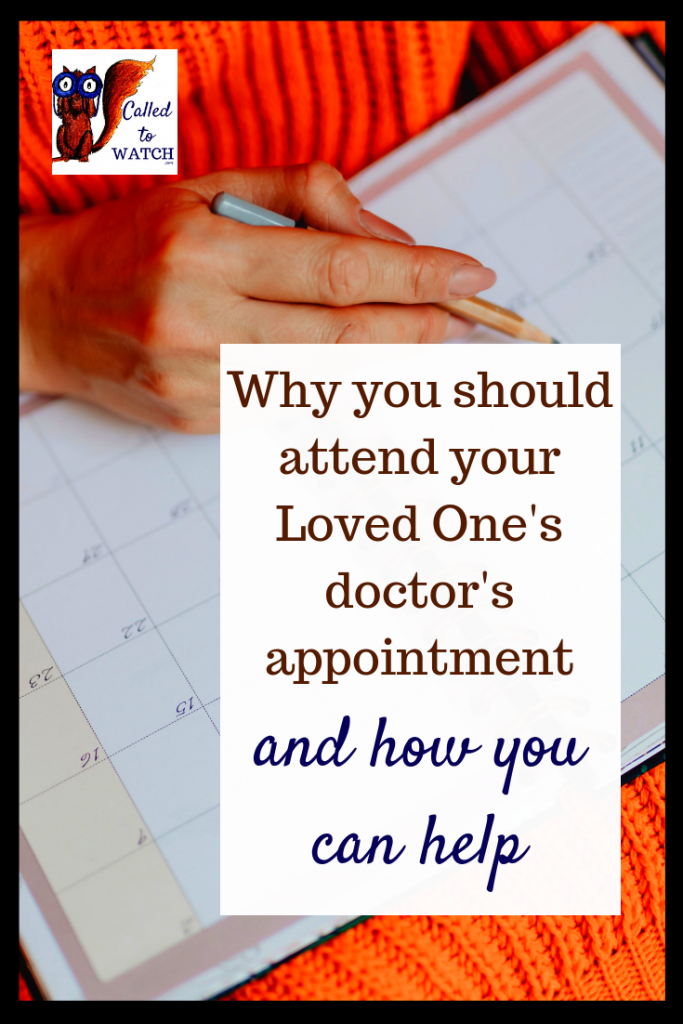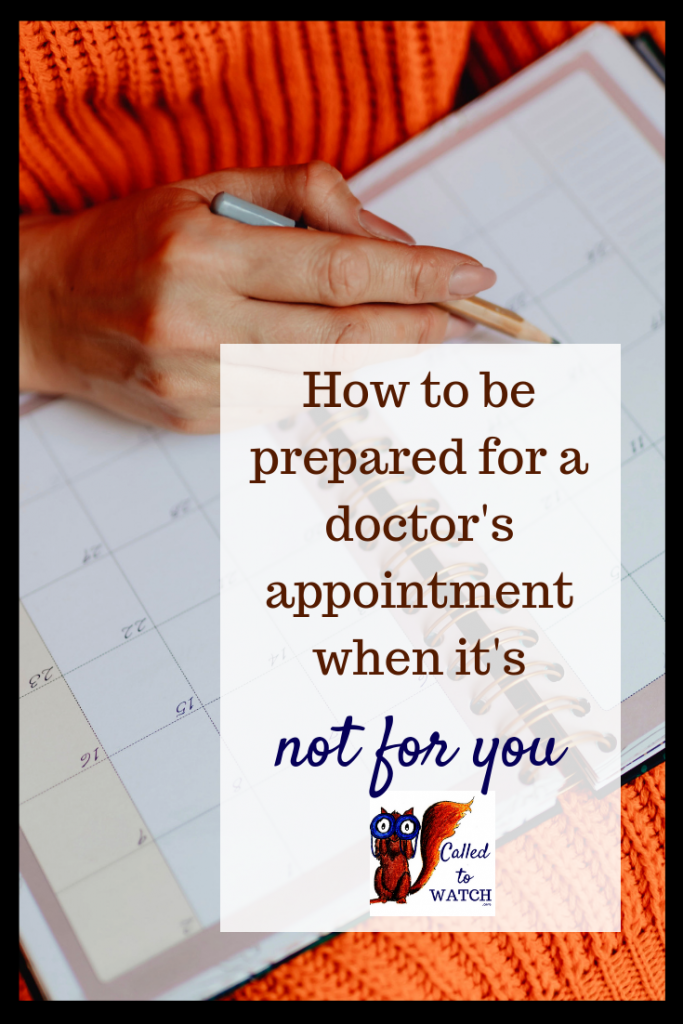A while ago someone I know was diagnosed with a chronic illness. After the initial diagnosis, she had to make an appointment to see yet another doctor. Before this appointment, I was chatting with her daughter and realised something rather abruptly: there is an art to accompanying someone to the doctor.
I’ve been to many doctors’ appointments in my life, both for myself and others. I’m neither proud nor ashamed of this, but I AM used to them.
And perhaps, not everyone is.
As a Watcher, a doctor’s appointment raises several questions: If it’s not for us, should we go? Is it important that we be there? What is our role? Are there reasons we shouldn’t attend?
Every situation is different and so is every person. I don’t think there are right or wrong answers, but I also think we can be a valuable asset at a doctor’s or specialist’s appointment. Here’s why:
4 reasons it’s worth attending someone else’s doctor’s appointment
Your mother/brother/father/friend might be the most independent person ever, but I still encourage you to offer to accompany them. You can be…
1: A second pairs of ears
The main reason is this: two pairs of ears are better than one. Very few of us are able to remember the entirety of a conversation. Generally we remember only what’s important to us, and so sometimes miss the bigger picture.
Two people will remember more than one. Two people have a greater chance of leaving the doctor’s surgery with a coherent explanation rather than just a head buzzing with new terms.
Your Loved One may be the cleverest person you know, but there’s nothing to lose by having you there as a back-up.
2: A second mouth
Your Loved One may come into the surgery loaded with questions, only to have them dissipate as soon as the doctor begins his explanation. They may be too busy understanding the diagnosis to think of new questions or be able to see the bigger picture.
what questions should you ask?
- Write the questions down before you leave home
- Actually pull out the piece of paper (our memories are fallible!)
- Try and remember the bigger picture: how will this diagnosis/medication affect your Loved One’s sleep, work, habits, routine, relationships, travel, outings, children, spouse, driving, bank account
- Repeat back the new diagnosis/information in one sentence as if you are explaining it to someone else, and check to see if the doctor agrees
- If you have odd questions – ask them! This is your chance. Ie. Is this similar to X? People say XXX, is this true? I read somewhere X, does this apply to everyone?
- Always ask for alternatives. What happens if we don’t do this or that treatment? What’s the best/worst case scenario? What are the other options? What are the statistics?
- Always ask for brochures or written information.
- Ask who else you can ask: a good specialist will give you the names of his colleagues so that you can seek a second opinion.
- Ask if he’s encountered similar cases before. What were the outcomes? How were they similar/different?
3: A second pair of muscles
Even the most assertive person can feel cowed in the moment of diagnosis. Your Loved One may normally be able to stand up for themselves, but sometimes in a doctor’s appointment everything becomes too much.
Doctors have power,
I suspect it’s because when we visit doctors, we see them as professionals (which they are), with more information and thus more power. In this environment it can be incredibly easy to find yourself swept along with their opinions and understandings, even if perhaps they don’t quite mirror your own. You can be convinced of something you don’t quite believe, or lead to see your symptoms as unimportant or trivial when they don’t feel that way to you.
and there’s limited time
Doctors are also busy people, and your Loved One can feel rushed or even find themselves being pushed out the door when they haven’t received all the answers they came for.
but you are in a special position too!
Don’t get me wrong. I know many doctors, am friends with many doctors, and have had wonderful experiences. Unfortunately, I have also had awful ones, and I know what it’s like to sit in the patient’s chair and feel like a professional is not listening to a word I am saying.
Without being obnoxious, I think we Watchers are called to stand up for our Loved Ones in these cases. Socially, we have a bit more leeway to question and argue and stand firm because our relationship with the doctor is not a patient-professional one.
4: Support
Your Loved one may be incredibly stoic, but the reality is no one can predict how they will react to unexpected news. We are all human, and sometimes all it takes is one ‘tiny’ thing or one ‘more’ thing to shatter us. You may not be needed as a shoulder to cry on or a hand to hold, but you very well might be.
Even if everything is fine, your presence can simply be another reminder to your Loved One that they are not alone. It can be a memory they can call upon at a later date.
Besides, who says appointments have to be a negative experience?
Perhaps your accompaniment means you can grab a coffee before/after and turn it into an outing. At the very least you can snigger over the waiting room magazines together!
Why NOT to attend your loved one’s doctors appointment:
It’s impossible
My friends, it can be difficult arranging our lives and work so we can attend our Loved One’s appointments, and sometimes it’s impossible. That’s okay. We don’t need to feel guilty about this. There may be someone else our Loved One feels comfortable asking, but if not, we are simply called to trust our Loved One to God.
It’s unwanted
Of course our Loved One may decline our presence, even after we’ve explained why we think it might be helpful, and that’s fine. In most situations, it’s their choice and we are called to respect it and not hold it against them, even if we feel it would have gone more smoothly with us there. It can be personally frustrating to hear information second-hand, but that is simply part of Watching.

A final reminder: it’s not about us.
It’s their appointment, their illness, their fears, their questions, their time. If they don’t want us, we don’t go. If they don’t want us to speak, we don’t speak. We let them ask all their questions first and we defer to their opinion.
We don’t bulldoze through their appointment, arguing with the doctor and demanding rights all over the place.
Let’s never lose sight of the fact that we are simply there as an adjunct, a support, a helper. Our motive must always be love, not self-satisfaction.
//Have you ever accompanied someone to a doctor’s appointment? Did you feel useful? Why/why not?
related posts:
Why you SHOULDN’T to fight someone else’s battles (when you want to)
Why you SHOULD fight someone else’s battles (when you don’t want to)
PS: Enjoyed the post above? Get the next one delivered straight to you! Sign up for email notifications
I’m also on Facebook, Pinterest, Instagram & Twitter! Meet me there for more interesting reads, resources and community.


